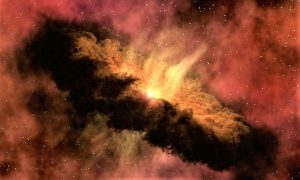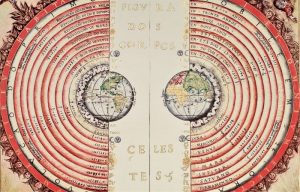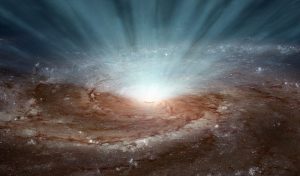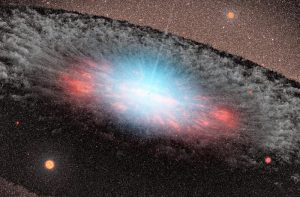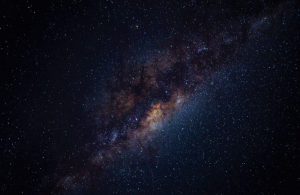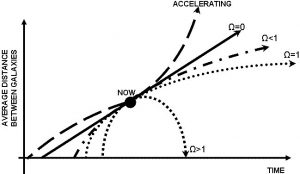Big Crunch
Some astronomers, who call themselves cosmologists, ask themselves a series of questions about the universe. The universe is enormous compared to a single planet, even a single galaxy, and its timeline is much, much longer. Because of this, cosmologists cannot know with certainty how the universe began or how it will end. However, they can gather evidence, make conjectures, and establish theories. One of the theories about the future of the universe is known as the Big Crunch theory, which says that the universe will someday stop expanding and begin to contract, falling inward until it collapses again into a super hot, super dense singularity.
What is the Big Crunch?
The Big Crunch is the theory that explains that the universe will stop expanding at some point and that for this reason, it will collapse, creating a black hole that will absorb everything in its path.
About the Big Crunch
The Big Crunch consists of one of the different theories about the final destiny of the universe. We could also say that it is the opposite theory to the Big Bang. The theory tells us that the universe was forced by a large amount of mass that would gradually begin to compress until it collapses. Because of this, galaxies would begin to move backwards, colliding with each other, the temperature would rise considerably, and the universe would end in a catastrophe, reducing again to a small point in space.
Who proposed it?
So far, there is no principal author who has been responsible for creating or formulating the theory, this is because Big Crunch theory is considered to have evolved out of science, but it is important to mention that the theory evolved out of Einstein’s origin.
Background
It is considered as the main antecedent of the Big Crunch, the Big Bang theory. Scientists believe that the central idea of the universe is in a continuous state of expansion, so the universe must have had a definite beginning.
History
The history of the Big Crunch theory had its origins basically in the 20th century, and it is a cosmological theory. It must be said that, in science, Big Crunch occurred about 25 years ago, and we have been trying to ignore this event ever since.
Characteristics of the Big Crunch
The main characteristics that we can mention with respect to the Big Crunch theory are the following:
- It states that the universe’s expansion will be reduced by gravity and the force of attraction that bodies have.
- It refers that the galaxies that exist in space are going to unify and will form in this way, the great shock.
- It is also known as the Great Collapse.
- It is a theory that is in charge of proposing the destiny of the universe.
- It is the inverse theory to the Big Bang
- It refers to the fact that the universe will reach a certain point where it will not be able to resist expansion.
- It is based on the model of the closed universe where matter and energy can produce a gravitational attraction that stops expansion.
- He explains that the universe would have the capacity to expand until it achieves an enormous contraction.
Postulates
This theory bases its postulates on the possible end the universe will have. The Big Crunch theory tells us that gravity would not allow cosmos expansion, so the cosmos would begin to shrink until crushed. The theory tells us that all matter and energy are going to unite in a single point, a situation that would cause death.
According to the Big Crunch theory, during the death of our universe, the stars will be extinguished little by little because they will no longer have fuel, the planets will become ice and each object in space will move away from the other at great distances. On another lake, temperature and energy will decrease in a process that will never end.
After the Big Crunch occurs and finishes, it is possible to have a new place through the creation of another Big Bang process. If this had already happened on several occasions, we would then find ourselves before an oscillatory universe; where each universe ends with a Big Crunch and gives rise to a new universe with a Big Bang and each new universe would join the previous one.
What problems does it have?
According to this theory, the universe is an oscillating universe, in which, after the Great Implosion, a new Great Explosion could take place; but if this had happened several times, we would be faced an oscillating universe. However, the theory of an oscillating universe contradicts the second law of thermodynamics; unless in each cycle a total destruction and restart of the universe occurs, including the disappearance of physical laws and the creation of new physical laws.
In addition, the recent discovery of dark energy has meant that many cosmologists no longer believe in the theory of the oscillating universe, nor do they believe that the universe is closed, although they do not completely rule out future collapse.
Importance of the Big Crunch theory
This theory is important because it tells us that the expansion of the universe, besides the Big Bang, would not continue forever. Contrary to this, at some point it will stop expanding and collapse into itself, pulling everything with it until it finally becomes the biggest black hole in history.
How to cite this article?
Briceño V., Gabriela. (2019). Big Crunch. Recovered on 23 February, 2024, de Euston96: https://www.euston96.com/en/big-crunch/
